A little bondage here, a few bodies draped there--
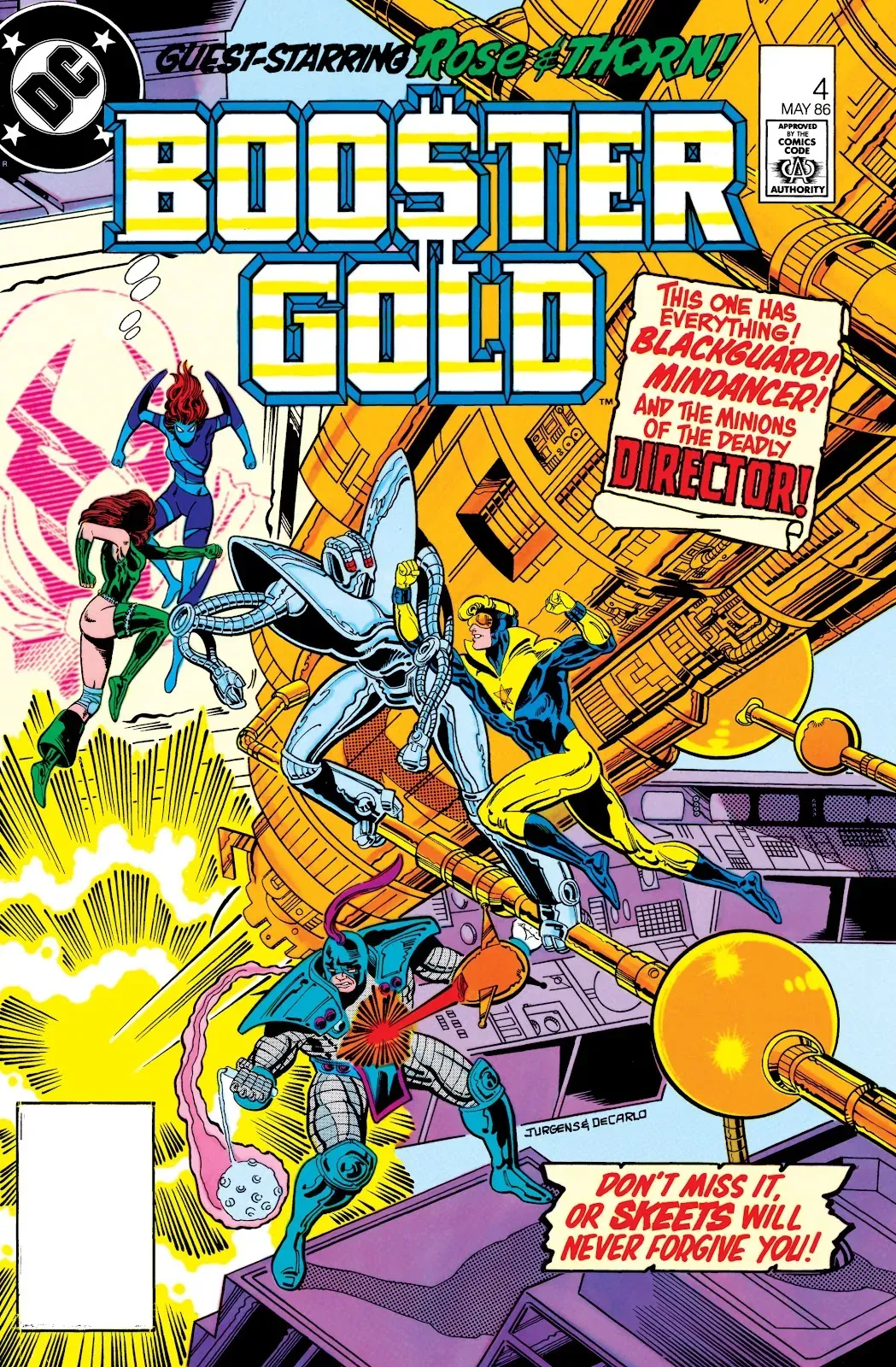
—and whatever the hell is going on with Mind(d)ancer’s knees and elbows! Welcome to the next issue of Booster Gold, Vol. 1!
Bulletpoints
This issue is good if you like:
- Our boy spending the first four and a half pages tied up spread eagle.
- Right next to his giant suitor, no less. 😳
- A blatantly, amusingly gender-coded fight, though the anatomy gets, uh— interesting as reveals happen.
- Trixie making sure everyone reading knows she’s Not One of Those Girls™.
- C’mon, Dan, really?
- Pretty much wall-to-wall battle otherwise.
This issue sucks if you’re looking for:
- Any of the interesting emotional resonance of two issues ago.
I might indeed retire the bulletpoints, as they’re getting lean on the ground. In the meantime, though, let’s get on with the show!
The Tally So Far
Urge to Slap Booster Silly: 4
Urge to Coo Over Booster: 7
Give Skeets a Medal: 5
Give Trixie a Medal: 4
Booster in Bondage: 2
Urge to Wrap Booster in Soft Blankets: 2
The Actual Review
At least, until I run off on some Booster-related tangent. Which I do have a tendency to do.
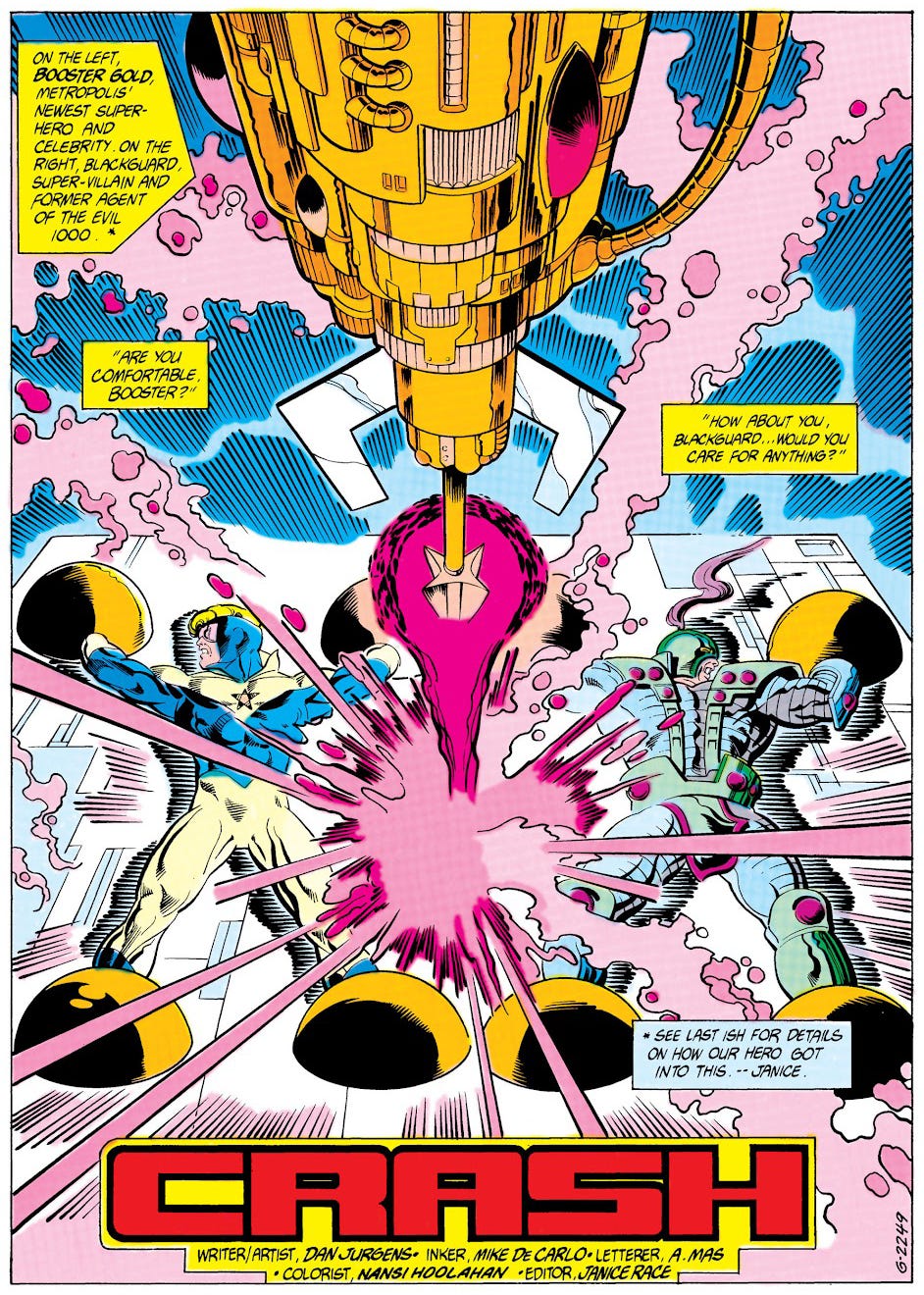
In the interest of fairness, I am not adding one to the whole Booster in Bondage count because this is a continuation of last issue. And frankly, it happens often enough in this book I don’t even need to pad the results. I will say, though, that although I’ve only caught a fair-but-not-huge chunk of Dan’s work on the various Superman properties, I can’t recall him ever tying the Man of Steel up quite so often — or so provocatively — as he does his lovely creation on the suspiciously regular.
And now that I’ve made the allegedly heterosexual of you gasp, wince or rethink your orientation—
We pick up with Booster in a suitable amount of trouble. Rather than just finding a quick way of disposing of him, Mindancer — in want of some ‘D’ still — decides to elaborately strap him and Blackguard down on a platform so she can carve them up with a solar drill. How and why she happens to have restraints made to truss up two dudes who are powerhouses handy, I probably don’t want to know. At least there’s a semi-plausible explanation for the drill itself.
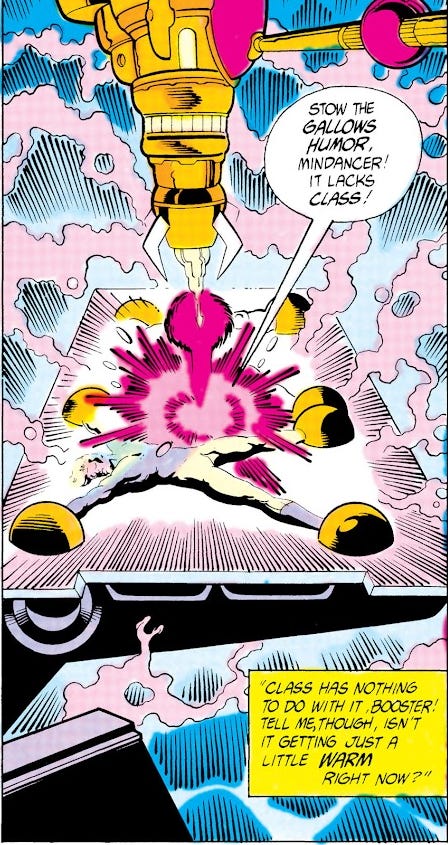
I have to admit, I am entertained by Booster telling someone to stow the humor on the basis of class or lack thereof, given both how he was dressed and how passively-aggressive and bitchy he was last issue on his ‘date’. Irony, thy name is sometimes Michael Carter.
Here, Mindancer reveals she can nullify his forcefield, which everyone and their brother apparently knows the origin of despite it being from the thirtieth century (?), further making one wonder why she didn’t just ice his ass when she had the chance. Instead, she seems more interested in testing out some weak humor and her giant solar drill.
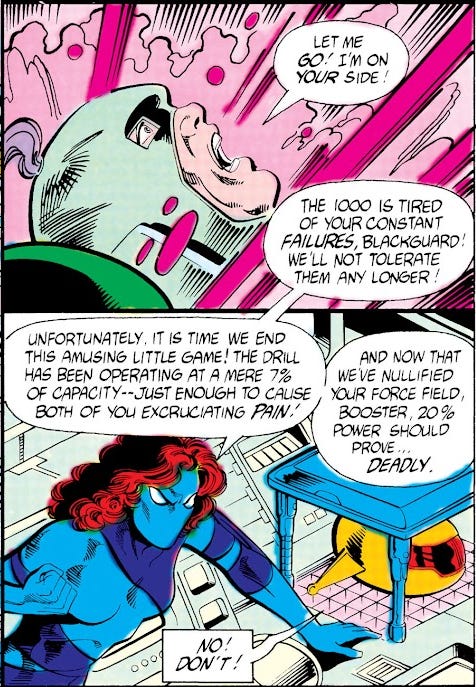
For all of her talk about it, though, Elbows Grace apparently fails at her primary objective. Hell if I know how, because she’s right: 20% should result in thoroughly baking Booster, and not in the fun way. But despite screaming in a tortured fashion, either his costume saves him from roasting like a turkey or she has vastly overrated the power of that solar drill. Either way, the man oughta come out of this with one wicked case of sunburn on his face and yet somehow does not.
From there, we go check on Thorn, who rightfully points out in narrative that this is a thoroughly screwed up body count.
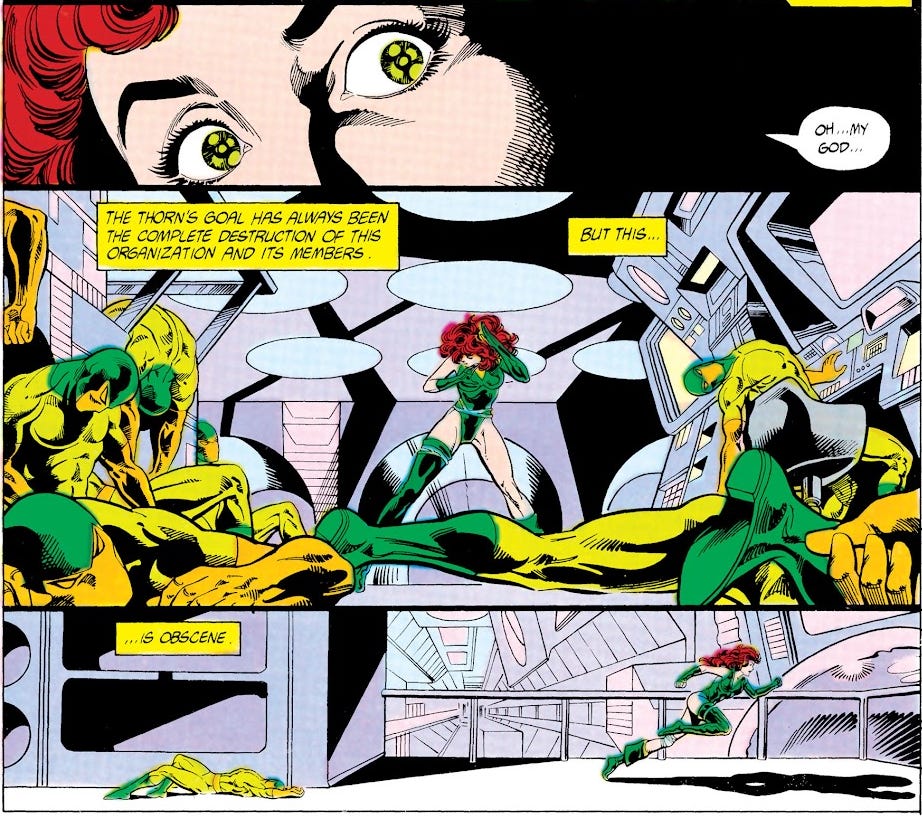
Beyond the fact that there are bodies all over the place — something like 900 of them! — you do indeed have to wonder whether these henchpeople had families. Or like— day jobs. Or anything. The casual way that they were all slaughtered is a head-scratcher, because they aren’t the 1000 anymore, clearly. They’re back to being the 100, at best, if any of the remaining living are even functional. Wrecking your whole organization just to get the mind-power to knock out one upstart superhero seems a little short-sighted if you ask me.
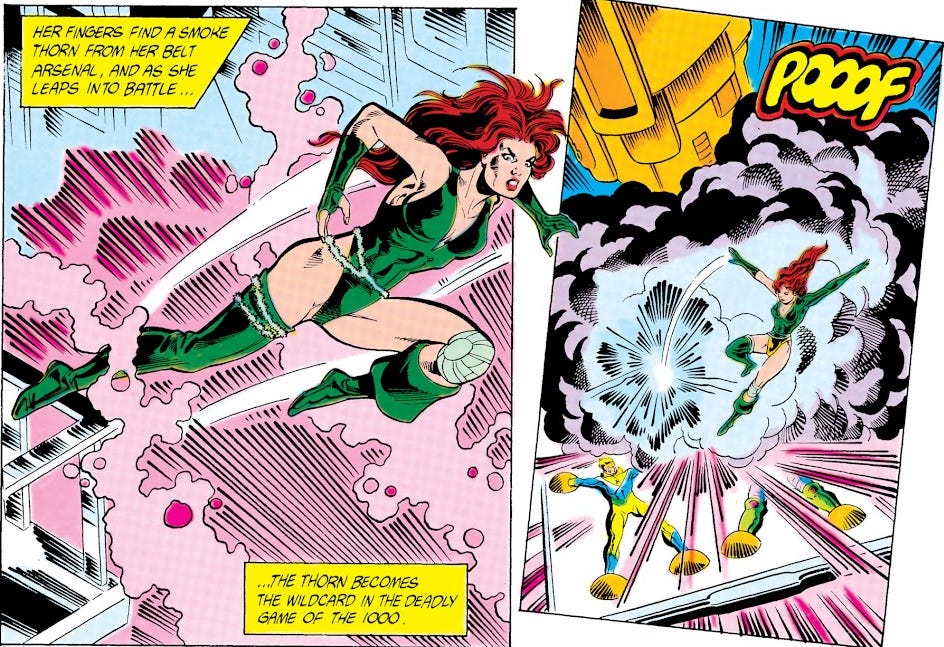
Fortunately for Booster (and hell, Blackguard!), it’s Thorn to the rescue. With a belt that has to be a real pain in the waist to wear, no less, given it’s made of actual thorns of various implausible types, those of which she can find, no joke, the specific type of without even looking.
I love comics, seriously, and comic book logic is its own delight, but as someone who has skin, I gotta say I find it wildly unlikely that Rose/Thorn’s costume was designed by a woman or even likely run past one, because only a man would think to stick her in a low v-neck, high-cut leotard and then wrap thorns around her waist. No wonder she looks like an absolute crazy lady in the first panel above. If I was walking around with those biting into my skin, I too might embody a banshee who looks ready to rip someone limb from limb.
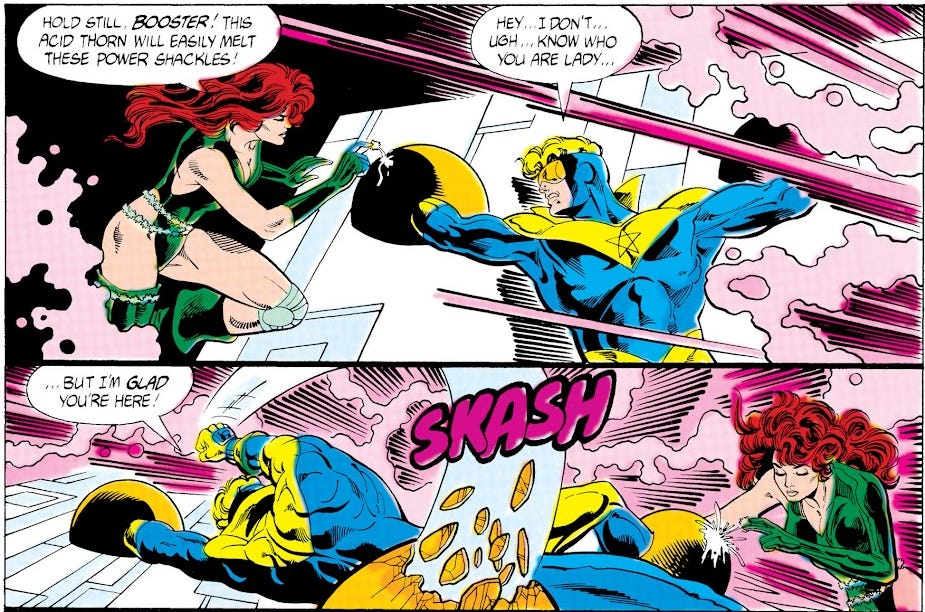
After an admonishment to hold still — which is kinda funny considering how incredibly little choice Booster even has but to hold still, given how he’s strapped down — Thorn rescues our boy from his slow-roasting session. Or, at least, the one on in the comics, since he’s still at my dubious mercy. 🤣
As to why Elbows Grace hasn’t turned the drill on both of them, apparently she can’t see through the smoke and her brain’s still a little fried from mentally walloping Booster. But this gives Thorn enough time to free Blackguard, too, and then all three of them hero-pose out of the carnage on their way to completely wreck Mindancer’s day.
But before we continue the battle—
A Feminist Digression. Lucky You.
From here, though, we take an interesting break to glance in on a very salty Trixie—
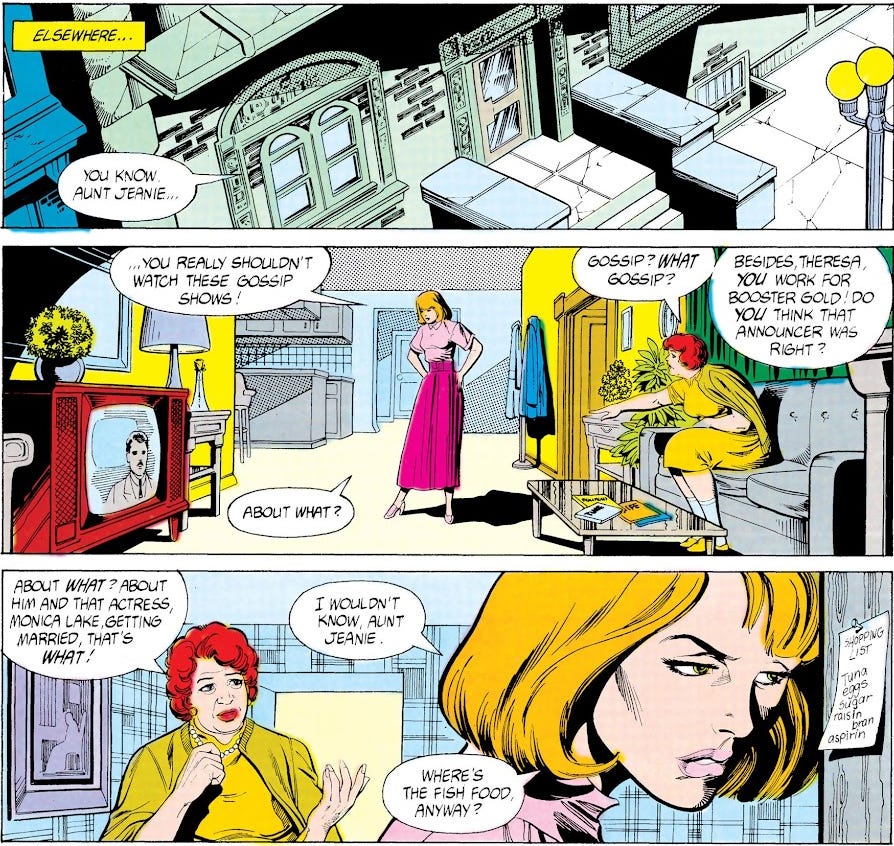
—who continues to be set up by Dan as a man-scold. I don’t know if it’s because I too am also a Midwestern cis woman who was raised in a family that went to church on Sundays, but the implications of these scenes are a very firm reminder of the times, the attitudes of men of that era (and shit, often this era), and also the divide in cultures between the coasts versus the center of the country— and not necessarily in a good way.
Like I mentioned in the review of the last issue, Dan seems to lean pretty hard into how virtuous Trixie is. The cross on the wall. The modest clothing with ankle-length skirts. Her doing exercise vids for legs she never shows off. Her hating the Goldstar costume, though clearly Dan didn’t. Crap like that.
And he also contrasts her clearly to that (literally!) gold-digging slut, Monica Lake.
If you just recoiled at me using that word, good, because that is undeniably what he was implying here: That the pretty, hard-working, modest Trixie is Good and Pure. And that almost all of the other women — from the mercenary creative director to the airhead chauffeur to the vicious Monica Lake — are Dirty and Bad. Or stupid. And this is very much the product of the time (though it’s something we still see even now, albeit less) and also a very sexist attitude.
Before anyone gets their gutchies in a twist thinking I’m just bashing Dan for his writing back then— I’m not. I’m a couple decades younger than him, but I grew up steeped in a similar enough culture. Those attitudes seep in regardless of intention, especially if they’re all you grow up in. I couldn’t and wouldn’t condemn mid-twenties Dan Jurgens for his underlying sexism here because even I probably wouldn’t have recognized it myself at that same age. It’s not something you start thinking about until you’re exposed to alternative viewpoints, particularly those of the demographic you clearly don’t belong to and the one most victimized by it.
And he does deserve some credit for pointing out the overt sexism — usually via Dirk — that was also everywhere at the time and often still is. He manages to adhere to the first few chapters of Feminism 101.
The problem we run into is that Dan will call out the overt stuff, and then immediately land on the fly paper of all the inherent stuff basically at the same time and there’s only so much credit you can offer to a man for reaching for low-hanging fruit when the tree’s eight times as tall.
Where Dan and I differ in our understanding of overt versus inherent bias is that I am a woman. I grew up underneath the expectations that I would be modest and virtuous and pure — which, of course, meant I should for sure be a virgin when I got married, which I was expected to do, and to a man! Because I wasn’t even aware queer people existed where I came from! — and that girls who put out were dirty and bad sluts.
(There is a discussion to be had about the prevalence of rape and how it’s viewed in this context, but not one I’m going to get into here. But I will say, as a survivor, the heavy implications that you should hide being raped are often directly related to your perceived purity, and that is part of why it is so prevalent.)
I won’t say it was to the level of Southern Baptist style bullshit for me, but I will say it was very much the background radiation of my young life and probably was the background radiation of Dan’s. And that it still is for a lot of people even today.
And Dan and I both would have been irradiated by it. But he, unlike me, would never have had to actually live under it. (Not unless he’s queer himself, anyway, which would put him much closer to knowing what it’s like to have to wear masks and never get to know your inner self.) He would have had his own set of dysfunctional expectations to meet, but they almost certainly wouldn’t have tied his value as a person to his prettiness, his virginity or his modesty.
(There’s another discussion to be had in this vein about Booster, though, given that we’ve studied how he’s valued and what he’s valued for, and how he’s intentionally depicted (as a natural beauty), and how that’s still quite a subversion even today. I won’t discuss it here, but I would like you to keep that discussion we’ve had about him so far in mind. Carrying on—)
Here’s the thing, though: Dan doesn’t seem to learn better, in writing something more nuanced than the intro chapters of Feminism 101. He’s still writing women badly decades later.
Walter says that he writes Lois well, and having recently read his Rebirth-era Superman stuff, I definitely do agree: He treats Lois Lane with a level of genuine love and respect, and he’s miles better at writing family dynamics and children by the time he creates Jon Kent (another of his lovely creations, if not my obvious fave, and another character who becomes explicitly queer canonically, rather than just reading queer like Dan’s first creation).
But writing one woman well doesn’t excuse the many times he writes them poorly. Or writes his male characters acting gross and sexist. Especially because it’s one of the more bitter things to me that he did do such a good job writing Booster himself as being non-sexist in this book (even when the narrative is), and that Giffen and DeMatteis actually managed to carry that forward in JLI— but then when Dan takes back over in the early 90s, his beautiful boy is suddenly doing incredibly skeezy shit like setting Bea up to profit on her body.
It’s wild to me that a character’s creator could actually skew their own creation so out of character that it feels like a slap across the face.
(And honestly, no shit, Dan seems to be one of the only regular authors — meaning non-one-offs — who does write Booster as being sexist, at least until you get to Giffen and DeMatteis in Formerly Known as the Justice League/I Can’t Believe It’s Not the Justice League, where they also seemed to forget all the work they did on Booster back in the day. Even Tom King, who I think is one of the worst writers of the modern day when it comes to established characters and Booster especially, doesn’t do that. And it’s bad when you do something worse than King.)
I guess the upshot of this is that you can see young Dan’s baked-in attitudes in this book and in these scenes, embodied most notably in Trixie Collins versus literally every other woman, but they’re ultimately forgivable because he was young and just out of the Midwest himself.
But later is a different story. Because later, especially when you’re stretching into decades later, he should have learned better.
Anyway, I hope I’ve got you noticing that background radiation, if you weren’t already inclined, because the only way these attitudes change is if we start asking questions, not only about the narrative, but about our own attitudes, too.
Now— back to the story!
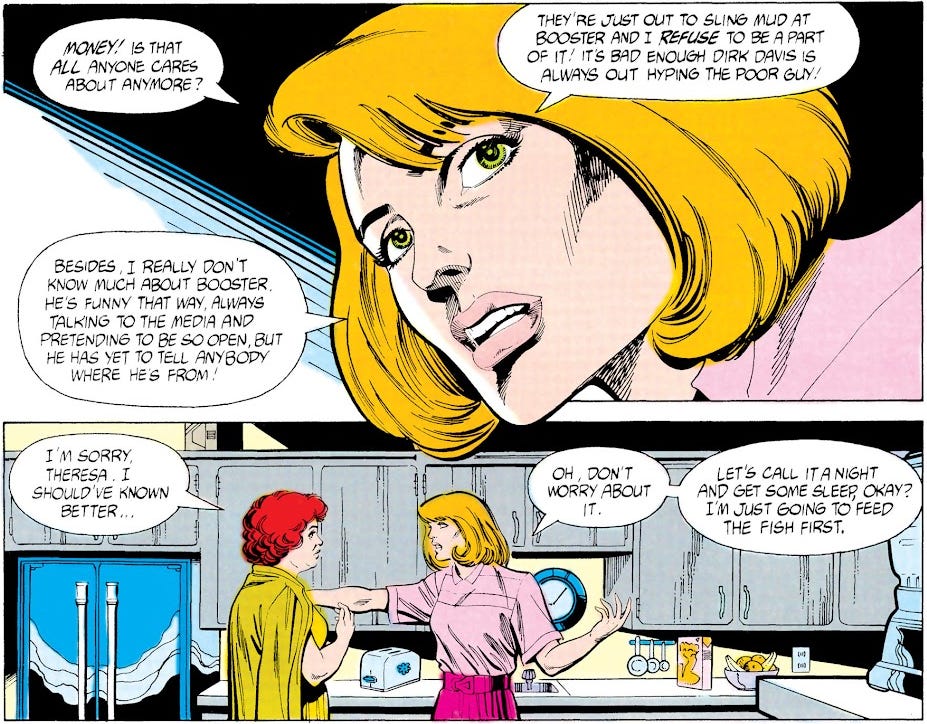
Despite the fact I don’t like what she’s being set up as, though, Trixie seems to be one of the only people actually noticing something that’s a theme for the rest of Booster’s life: Just how guarded and closed-off he really is. It’s in this kind of moment where she shines as a character; while it’s not the same thing as her reading as a full, independent person in her own right, it does display observational skills and a sensitivity that might well have made for a much better role as time went on: As Booster’s friend, without the underlying romantic possessiveness.
This isn’t a feminist digression, but a brief and queer one: For all that people whine about ‘why can’t men just be close friends’ when people talk about the queer subtext that’s screamingly obvious between Booster and Ted later (as if there aren’t a whole bunch of close, platonic male friendships all over DC Comics, let alone all media, and so writing them as explicitly queer is somehow stealing something from straight men everywhere 🙄) the real question they should have asked is why Booster and Trixie couldn’t have been genuine, platonic friends. She does clearly care about him and vice versa. They do have some major things in common, like their statuses as outsiders.
Even more importantly — and this is something I’ll get into later — Booster himself clearly sees her through the lens of friendship. He doesn’t act romantic towards her until the very end of this book (and even then, it feels tacked on and not all that sincere, more as a last minute thing Dan threw in there to try to wrap that storyline), but he does risk showing her some of who he is without that opaque public-facing mask on before that. And it never once comes across as romantic on his side, though it makes her act decidedly proprietary over him on hers.
(It’s also one of a number of reasons about why Booster reads as queer even in this book, long before the JLI. I swear, I will write that probably multi-part dissertation soon. This would be the month for it.)
Anyway, there was a missed opportunity here. Even if the end-game was shipping them, building a real friendship between them would have allowed for that, and it could have been genuinely good. Think the dynamic between Buddy and Ellen Baker; I could see something similar play out for Booster and Trixie, had things been handled better back here.
But even more, there was a missed opportunity to write a solid, genuine male-female close platonic friendship, and lemme tell you, that’s about as rare on the ground as solid queer male romances in pretty much any media.
And certainly it’s more rare than ‘😭 why can’t men just be close friends 😭’.1
NOW— back to the battle! The very, very long battle. Where Booster’s obviously still a bit rattled after his brief turn thinking he lost his ‘bot, given how sweet and slightly clingy he’s gotten about Skeets.
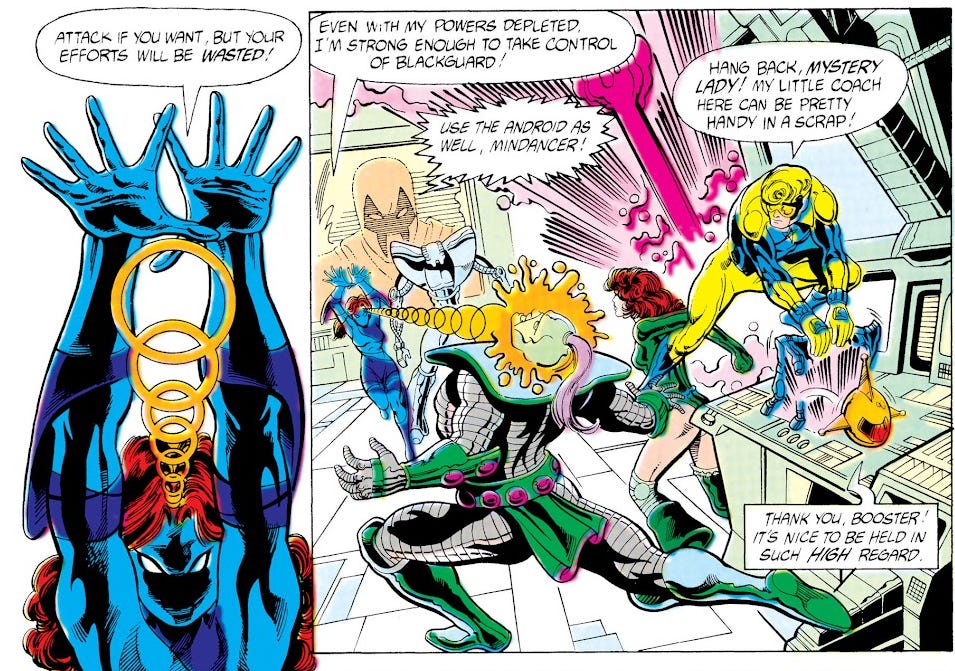
Seriously, love that. It’s a great bit of character work, because before that shakeup, Booster was like just any other kid who took his guardian as granted — namely, self-centered and dismissive and ‘you can’t tell me what to do’, and not really appreciating all Skeets does for him — and after it, he’s clearly a whole lot more aware of not only how important Skeets is to him, but also how much he loves his ‘bot back. Even in the middle of a fight, it’s a tell of his age and his isolation, but also a light shining on a soft part of his heart.
It’s not to say he doesn’t have his moments later where he forgets — as people that age often do — but it’s clear here that he’s learned a bit of a lesson, anyway.
As if Blackguard’s day wasn’t lousy enough, Mindancer co-opts his brain to puppet him around. Seriously, that man’s had a rough time recently. All he wanted to do was maybe provocatively restrain a twink superhero from behind in a very intimate fashion, and the next thing he knows, he’s being puppeted around by Elbows Grace. Whose only opponent ostensibly has a uterus because like I said— this fight is hilariously gendered. 🤣 Seriously makes me appreciate Booster’s debut in JLI.
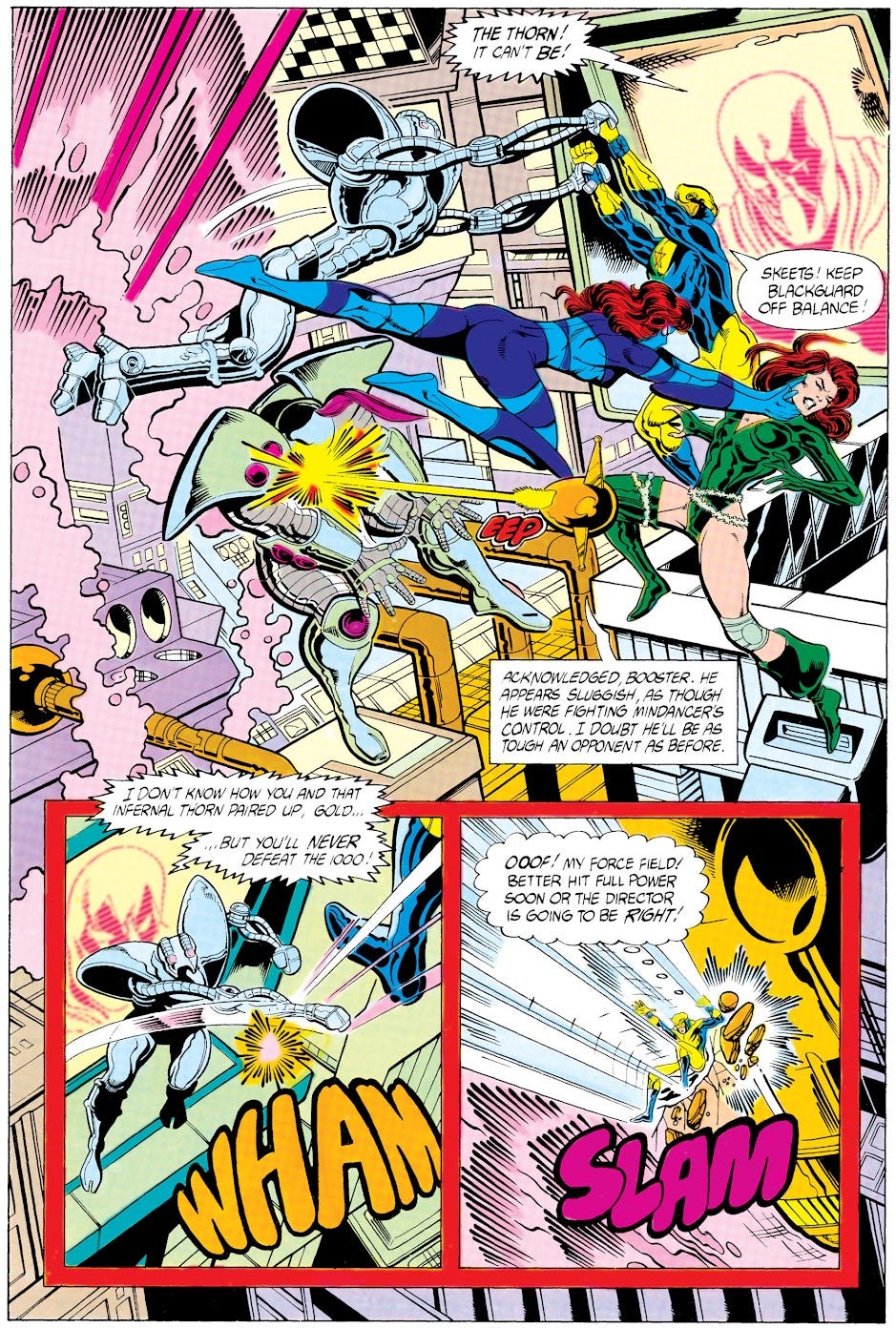
(As a quick aside, I really love how Blackguard’s massive shoulder-pads manage to embody everything wrong with Eighties fashion. LOL! Right up there with Dirk’s mustache and Booster’s inexplicable collar on his otherwise skin-tight suit.2)
Booster gets slapped around a few times here, which is always entertaining when he has his forcefield to keep him from serious injury. But while it is entertaining, it’s not actually all that interesting. Booster becomes a projectile long enough to knock the solar drill into running wild, while Thorn and Mindancer exchange punches.
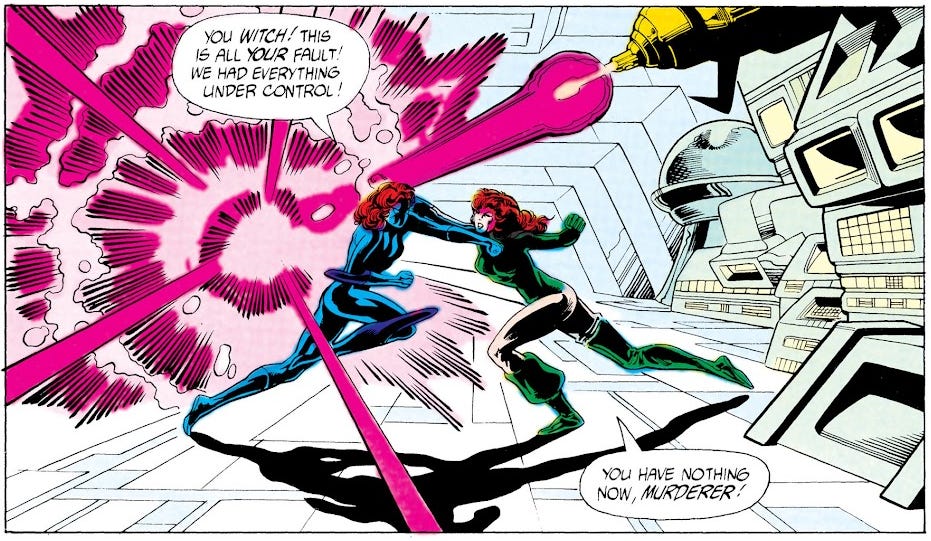
Meanwhile, The Director armchair quarterbacks the whole thing, and Mindancer no doubt regrets that she wiped out like nine hundred dudes just to mentally wallop that upstart Booster Gold, since she can’t do anything now against Thorn. And if that wasn’t enough, the solar drill is coming right for the two of them.
Speaking of our boy, though, he’s still in the air fighting — as is Skeets — which leads to this exceptionally cute bit of dialogue:
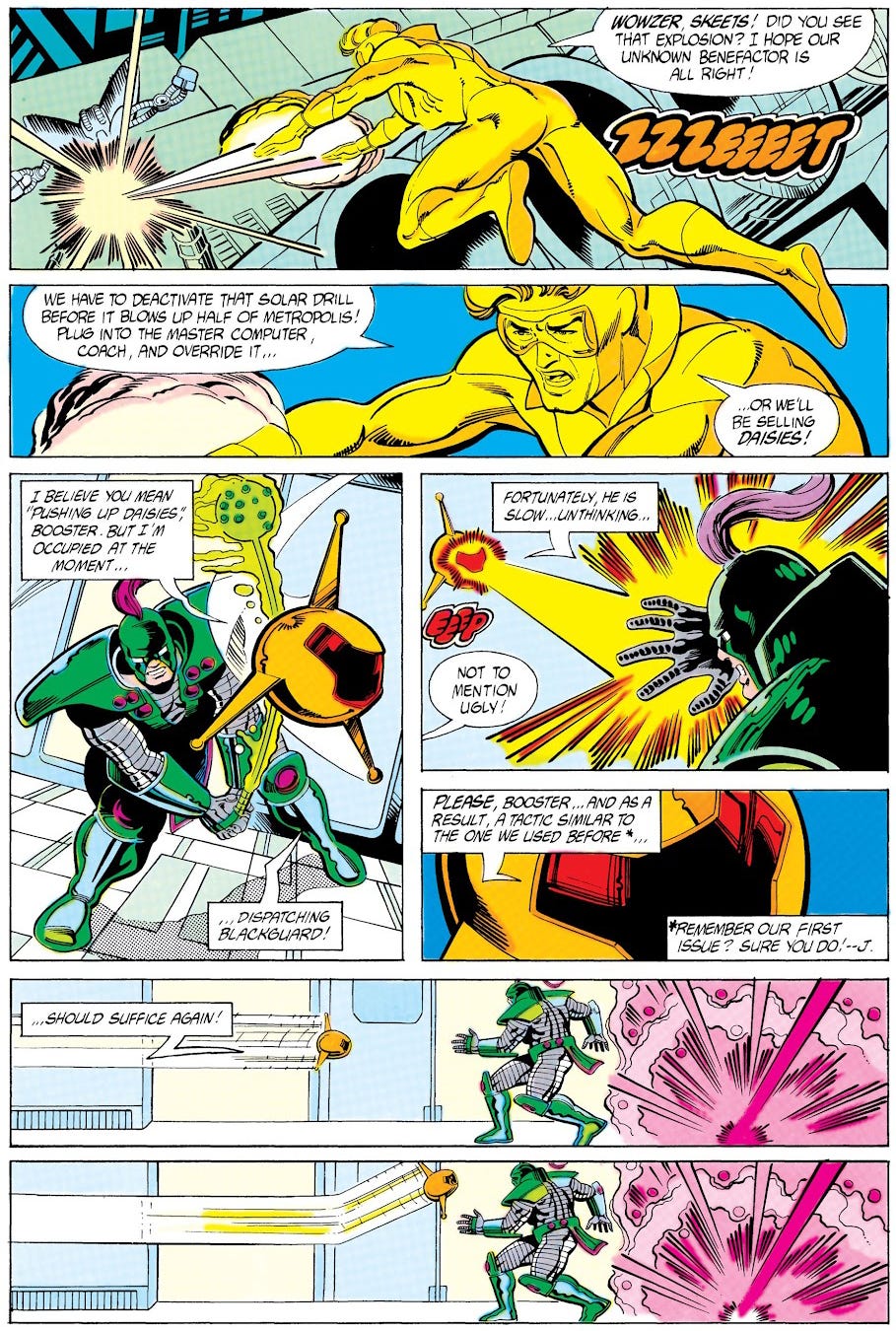
I know I’ve said it before, but it bears repeating, just how fantastic the whole dynamic between Booster and Skeets is throughout this volume. In later books, Skeets often comes across as way more of a sidekick than he actually does here; here, beyond the fact he’s playing parent, he and Booster seem far more like equal partners than anything else.
It does tie into what I said in last issue’s review about how Booster’s whole story — in the 25th Century and in the 20th — is essentially a story of exploitation and how, at least in this time, the only being who isn’t after him for something is Skeets. Whatever else, you never once get the impression that Skeets wants anything but what’s best for his disaster human; even when he does make an apparent mistake or two (like when they meet Superman shortly), even when it looks like outright betrayal, the affection’s nonetheless plain.
And I mean— there’s nothing about that dialogue above that isn’t adorable.
Skeets manages to take Blackguard out — more than proving his weight in gold (ahem) and then some, which frees him up to try to help his Disaster Person deal with that android. But despite a valiant attempt, Booster still gets turned into a projectile again:
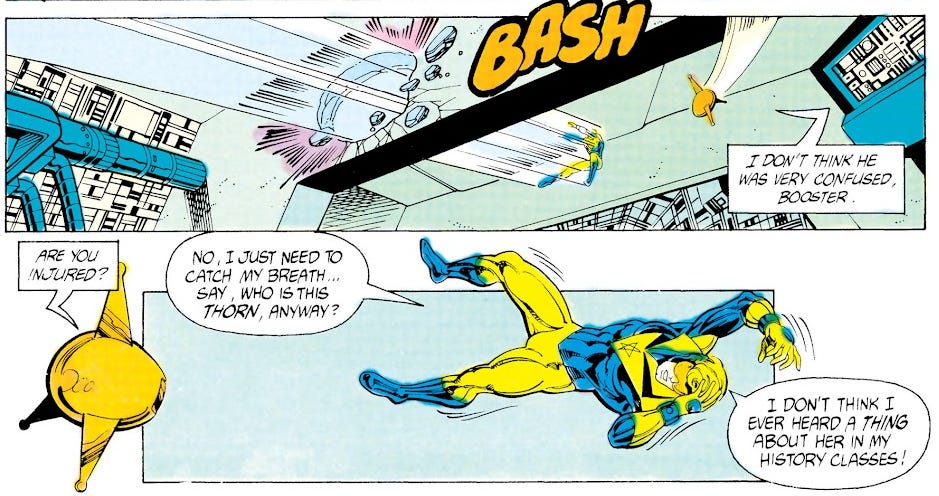
I believe this is the first time he’s properly knocked off balance from an actual physical hit in this book? If I’m remembering correctly. It’s nice to see that he has limits, as often enough you have people coming up with a thousand ways to depower the likes of Superman to impart some urgency and danger into the narrative. I think it makes sense to write a hero more on Booster’s level, at least if you want him to be in some type of danger often enough to raise the stakes: He’s relying on tech mostly, and a certain natural flair for heroics, but even with the impressive tech, you can occasionally knock him around and shake him up. He’s got enough going for him that you could put him in battle with some real dangerous bruisers, but you also don’t have to come up with a ton of ways to depower him from the outside: He can just be overpowered, as we later see Doomsday do to him. (And talk about a brutal, heart-wrenching fight with consequences for our boy here, though not as many as there should have been.)
Anyway, this gives us a chance for some exposition, where Skeets informs both Booster and the reader about who Thorn is. Which suggests it was Dan who came up with the very pokey, very fashion-unforward costume she’s wearing. 🤣 Booster says she seems sort of familiar, but I don’t believe we ever see an actual payoff to this, though it seems to be setting up for one.
But before much else happens, Booster gets hit yet again, and decides to go as Crazy Eyes as Hal Jordan regularly does in the 60s.
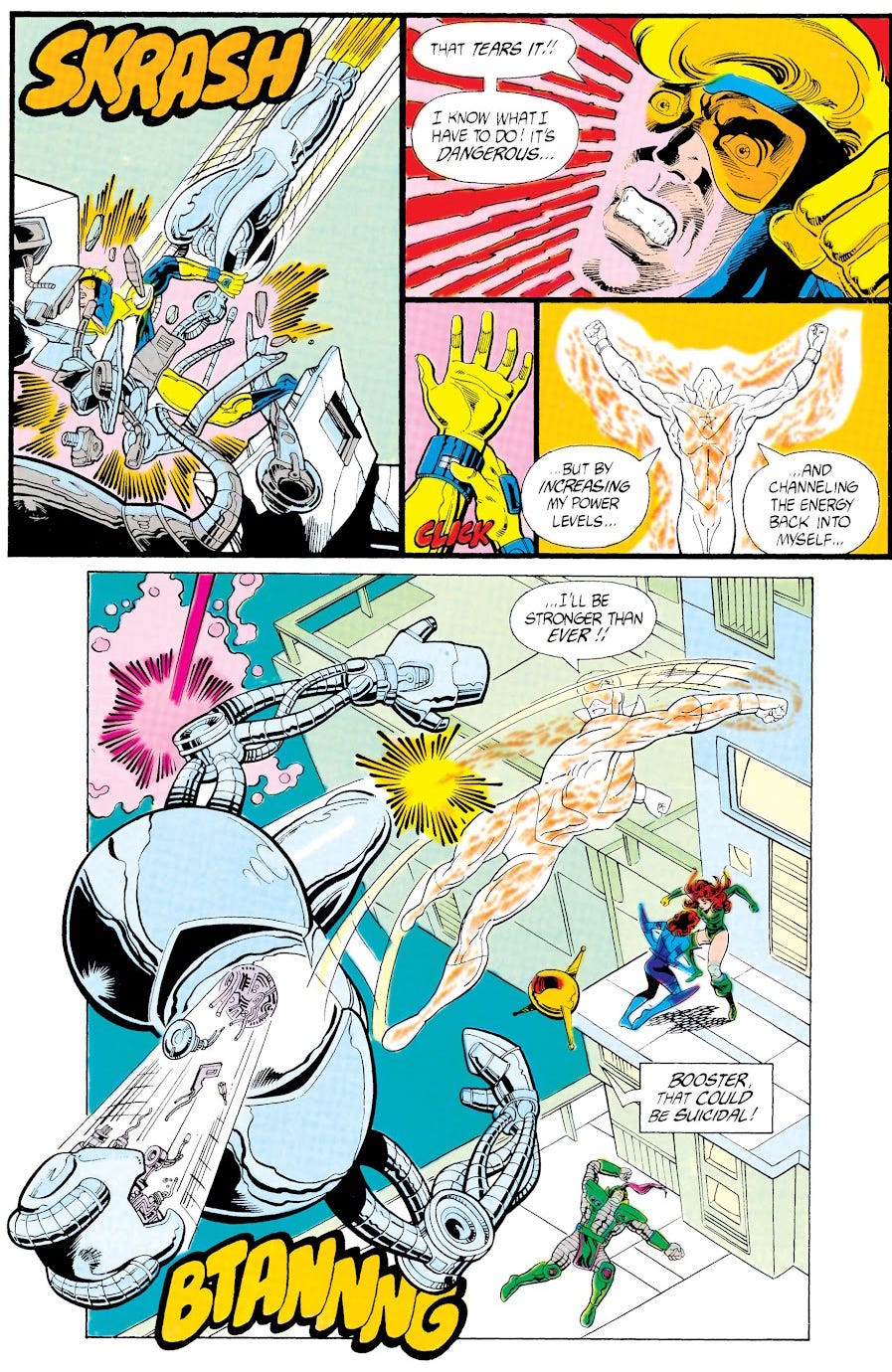
So, we’re treated to Booster in his Super Saiyan form, which is a trick he uses here that I don’t believe we see him using again? Which I’m actually pretty okay with, because it strikes me — like the whole ‘mass dispersal’ thing — as something cool Dan was getting geeky about that had very little useful applications beyond it.
After Booster shows off (and apparently wipes himself out in the process), Skeets takes charge, since the solar drill is going nuts and someone needs to do something.
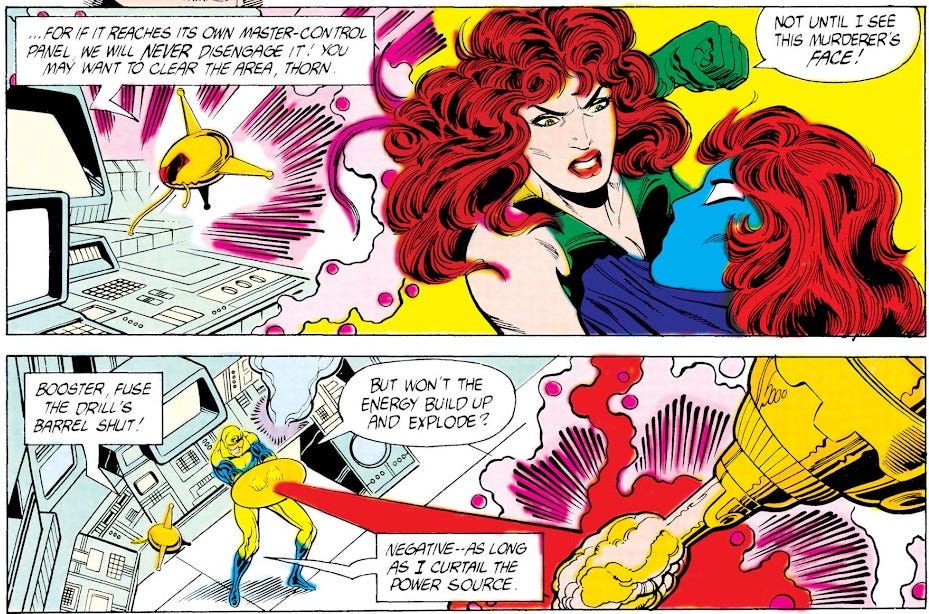
Naturally, Skeets solves the problem there, despite Thorn apparently thinking demasking Mindancer is somehow more important than getting fried to a crisp. But what follows is possibly one of the funniest crimes against anatomy that I’ve seen outside a Liefeld comic.
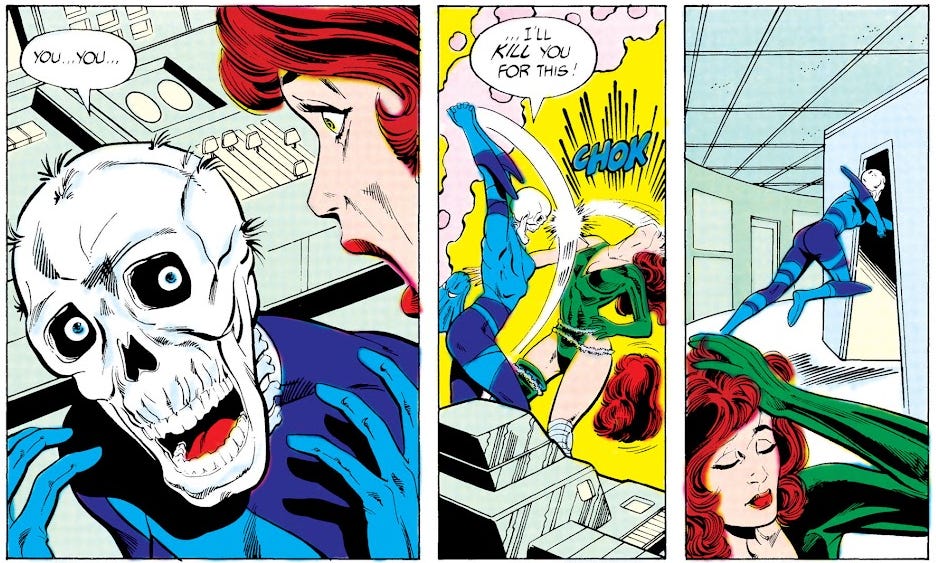
I can’t. I just.
Dan. Dan, why.
I mean— beyond the fact that is not how skulls work (we’ll pretend that maybe this is some kind of magical curse??), this is also not how soft tissue works. For being, apparently, a skeleton with— idk, eyes and a tongue, and tufts of hair growing out of her skull???? — you have the fact that for a walking bag of bones, she has a pretty terrific ass.
Like— how does that work? Is the costume padded? How does she move without muscle? Or does she had a body under her neckline???
I’m at a loss here, so I guess I’ll just move on whilst shaking my head in blank dismay, ‘cause hell if I can figure it out.
After that— whatever the hell, we find out they were three seconds from a catastrophic explosion, and then we get this dangling plot-thread that never gets tied off:
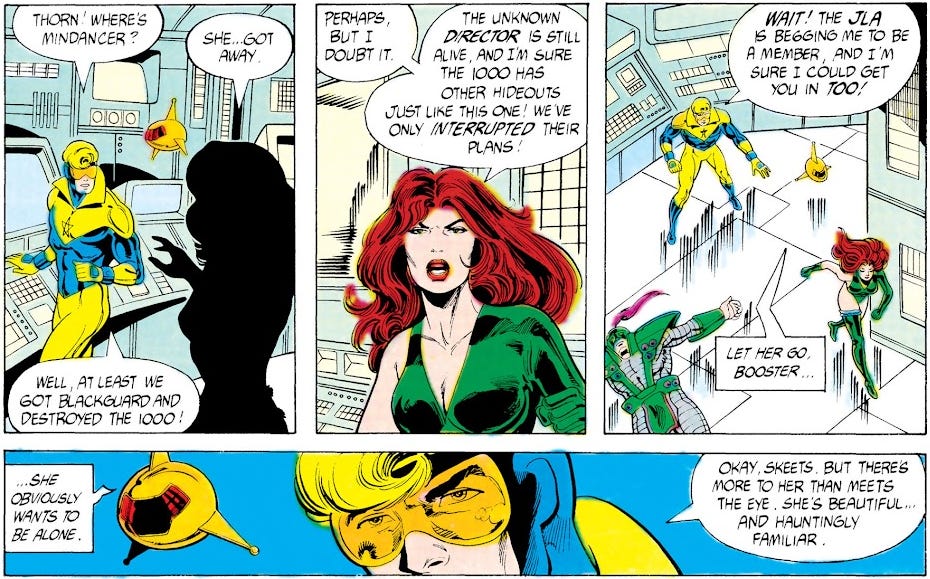
Again, we never do find out why Booster thinks she’s familiar. He calls her beautiful, but doesn’t seem particularly serious about following up on her past this, either. It makes me wonder what Dan mighta had in mind here.
What follows after all the bodies are on the floor and all of everyone else has cleared out is possibly the most interesting part of this issue with regards to Booster’s characterization:
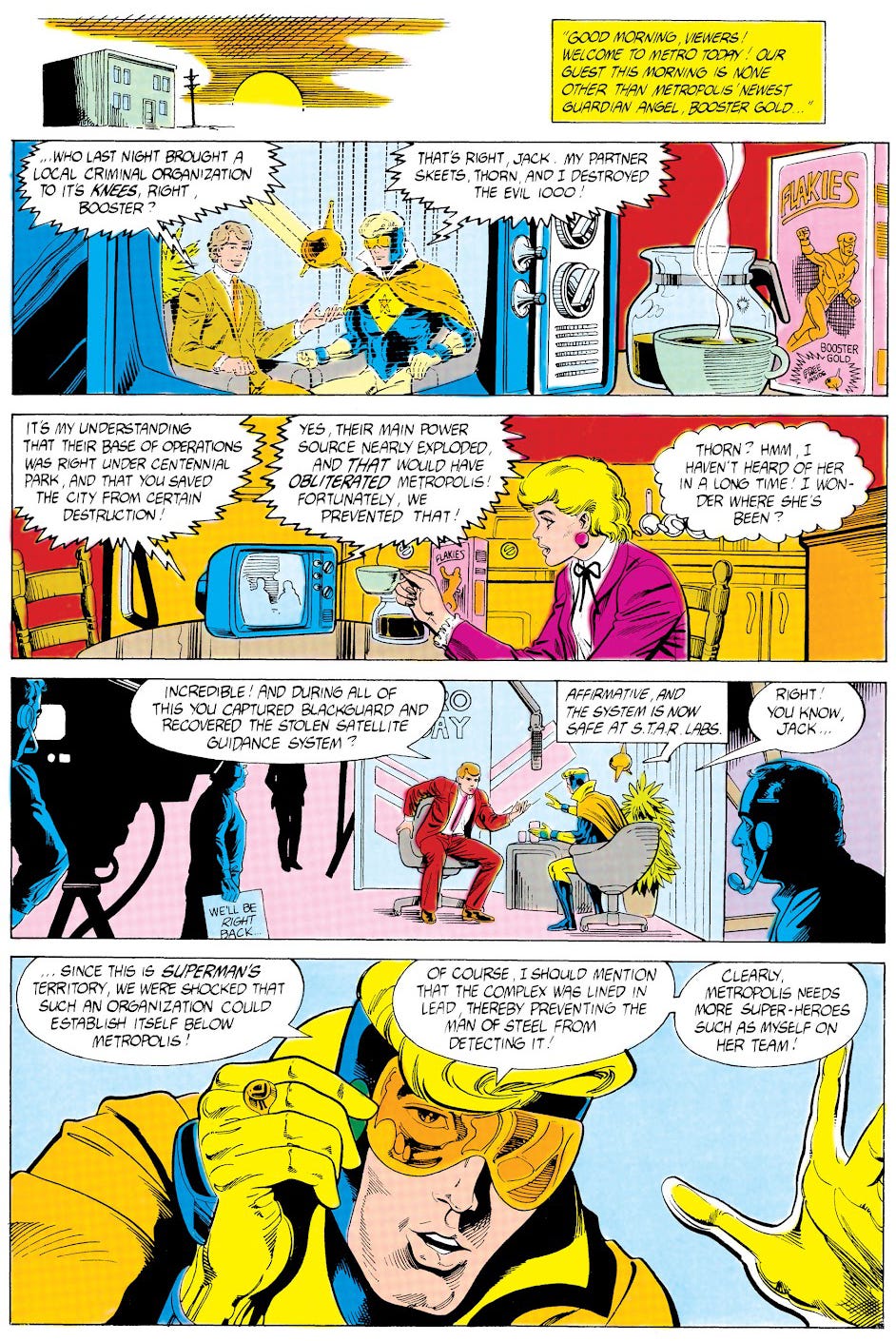
First, the good: Despite being kinda self-aggrandizing — and wearing a cape that has never quite made sense in terms of fashion choices — Booster makes sure to share the credit for taking down the 1000 with Skeets and Thorn. It’s one of the things that’s often overlooked about him: His willingness to give credit where it’s due. For allegedly being selfish, Booster doesn’t really try to own any triumph that’s not his, and indeed sometimes carries responsibilities he actually shouldn’t. He shares the credit here with Thorn and his ‘bot; later, he tells Ted he’s brilliant (oh god, my heart); later still, he makes sure Jaime knows he’s done good work.
What it seems a lot of people take for selfishness is Booster wanting credit he is actually due. In a world where altruism is valued over almost everything else, a man wanting credit for his good work is seen as being so much more of a crime than it really is. It’s a shockingly dysfunctional mindset amongst the hero community, and frankly, poor Booster gets stuck in the village stocks for a whipping over it throughout the rest of his existence across multiple timelines; people (writers and in-universe) forget every third issue that he bled as much as anyone else in the latest recent all-hands-on-deck battle. Of which there are many.
Of course, then our boy decides to whip out his obnoxious side by taking potshots at Superman. On one hand, it’s— very much the kind of ‘please pay attention to me’ thing a guy with Booster’s background might resort to. Because if he’s been here for months, and hasn’t managed to meet the Man of Steel yet, he would be uncomfortably aware of where he ranks in the hierarchy of Metropolis and would chafe against that even as he tries to convince himself that his money and endorsements and penthouse and business somehow elevate him.
Like— this is what a poor kid does. This is something I did, what feels like a lifetime ago. The self-aggrandizing, yes. But also the ‘please pay attention to me’. That desire for credit he’s due, the poking at Superman, all of that is such a tangled up, perfectly understandable desire for the authentic connection and reassurance of his worth as a hero (and probably as a person, since how Booster values himself is pretty unhealthy), which he’s absolutely not getting anywhere else absent Skeets, and from someone he actually respects (if sometimes reluctantly).
All that being said, yeah, it’s also a kind of self-destructive instinct and obnoxious to boot, so yeah, I kinda wanna slap him silly for it. Especially as it comes back to haunt him here shortly.
The rest of the issue dips into the tongue-in-cheek fourth wall humor of the comic book folks deciding to indeed do a Booster comic with a cute sendup about the Legion. Then we slide back over to Goldstar, Inc. for Dirk stroking Booster’s ego some, then this particularly entertaining wrapup, which unfortunately will leave a good setup for humor to die on the vine:
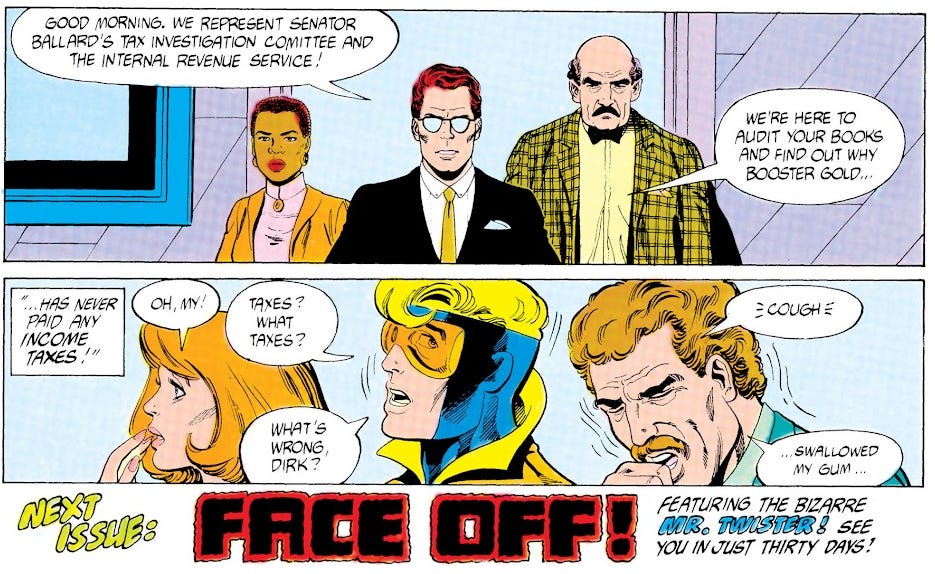
I, for one, would have loved to have watched Booster sit on a floor surrounded by stacks of papers and receipts trying to survive an audit, because that’s my current day job. 🤣
So— that was issue 4. I can’t say it was my favorite, because I’m really not a fan of long, drawn-out battles unless they’re going to reveal something about a character or several that might not have been otherwise. This one kinda strikes me as something that coulda been wrapped in half as many pages. But we did get to sidestep into some discussion on feminism and sociology, so that was something.
Walter rates this one at ⭐⭐⭐⭐ out of 5. Personally, though, I give it barely three. (I don’t read his reviews before I’m to this point in mine, just as a note. That means it’s sometimes fun to see where we diverged in our opinions at the metaphorical afterparty.) Walter likes this one and says it’s the contrast between Booster’s and Thorn’s personalities (and Booster in action) that saves it from tedium, while I honestly think it’s kind of the opposite. I don’t think this really reveals much about Booster that we didn’t already know, aside a capability that won’t really matter in the future, and I don’t care enough about Thorn to find her interesting.
I feel like you could definitely skip this issue, though I do love how Booster’s acting with Skeets, and how Skeets takes charge the way he does. Nonetheless, it’s pretty mid.
The Final Tally
Urge to Slap Booster Silly: 5
Urge to Coo Over Booster: 8
Give Skeets a Medal: 7
Give Trixie a Medal: 4
Booster in Bondage: 2
Urge to Wrap Booster in Soft Blankets: 2
Tune in soon — as soon as I’m able — for Blue Beetle (1986) #5, and heck, maybe the very relevant dissertation The Queer Reading of Booster Gold. Which I have plenty of material for, if only I can summon the brain power. LOL!
And, thanks to a $500 tooth repair, and another $485 farewell to our 16-year-old beagle boy, if you want to throw me a tip or subscribe on the Substack version, I could definitely use the help.
See you hopefully soon!





